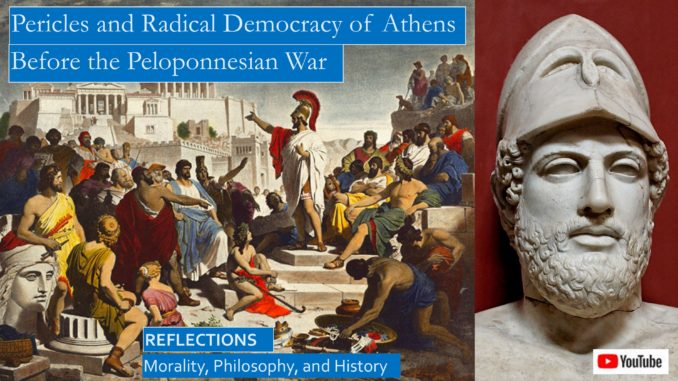
Why study the Peloponnesian Wars? Simple, you cannot understand Greek philosophy and history without studying these wars. We did not want to cut any more videos on the Platonic dialogues until we studied the Peloponnesian Wars. Socrates lived through and fought in these wars and was tried and executed after these wars. Many dialogues respond to issues and questions raised by these wars.
The brilliant and outrageous war leader of both Athens and Sparta, Alcibiades is a leading character in the famous Platonic dialogue, The Symposium, where Alcibiades characteristically crashes a dinner party attended by Socrates. Alcibiades was both a friend and a student of Socrates, and indeed in the Battle of Potidaea early in Peloponnesian Wars, Socrates saved Alcibiades on the battlefield. Alcibiades is given a Platonic dialogue of his own, though scholars debate whether this dialogue is genuine, though it was highly regarded in in the ancient world as an excellent introduction to Platonic philosophy.
YouTube video for this blog: https://youtu.be/uhtGzfxVdzk
YouTube script with more book links: https://www.slideshare.net/BruceStrom1/pelopponesian-war-fifty-years-before-sspdf
Link to view complete series of blogs on the Peloponnesian Wars:
https://seekingvirtueandwisdom.com/category/peloponnesian-wars/
Link to view complete series of videos on the Peloponnesian Wars:
https://www.youtube.com/watch?v=szi7-9QQWI0&list=PLJVlY2bjK8lg2pivnGN3m13VI8YstKs0T
Another one of Socrates’ students was Critias, a violent leader of the Thirty Tyrants who were placed in power in Athens after she was defeated by Sparta at the end of these great wars. After the radical democracy overthrew these tyrants, these suspect friendships made the Athenians suspicious of Socrates, especially since he was known to criticize the democracy. Indeed, these suspicions were a contributing factor in his trial for impiety and his subsequent execution, events memorialized in their own Platonic dialogues. And the preeminent Platonic dialogue, the Republic, seems to be conflicted as to whether the Spartan or the Athenian form of government and culture is superior.
Finally, to the Greeks, this was a war like no other war, involving nearly all of the Greek city-states in the eastern Mediterranean Sea and Persia, similar to the two great wars of modern times, the two World Wars.
THUCYDIDES THE HISTORIAN
Herodotus wrote the history of the Greco-Persian war while Thucydides started chronicling the Peloponnesian Wars. In his introduction, Thucydides writes: “Thucydides, an Athenian, wrote the history of the war between the Peloponnesians and the Athenians, beginning at the moment that it broke out, and believing that it would be a great war, and more worthy of revelation than any that had preceded it.”[1]
Herodotus had more piety, by ancient standards, he included many references to the gods and how they influenced history in the distant past. Thucydides rarely mentions the gods, although he does mention oracles and omens, he seeks political explanations and natural causes for his histories, many scholars regard him as the first modern historian.
Thucydides was born several decades after Herodotus, they were contemporaries, although it is unlikely that they ever met. Although Thucydides lived through the entire Peloponnesian War, he died before completing his history, stopping mid-chapter and mid-sentence. His history was resumed from that point by the Greek writer and historian Xenophon. Both were generals, but Athens exiled Thucydides after he was unsuccessful in preventing Amphipolis with its silver mines from being captured.
JB Bury, in his book on Greek historians, observes: “In his introduction, Thucydides sets a new standard of truth or accurate reproduction of facts, and a new ideal of historical research; judged by which, he finds Herodotus wanting, he condemns him expressly for aiming and providing ‘good reading,’ rather than facts, and for narrating stories the truth of which cannot possibly be tested. He does not seek himself to furnish entertainment or to win a popular success, but to construct a record which shall be permanently valuable because it is true. Thucydides warns his readers that they will find nothing mythical in his works.”[2]
JB Bury continues, “While Herodotus was influenced by the epic, the artistic method of Thucydides must rather be compared with that of the drama. Thucydides adheres as closely to his argument as a tragic poet,” and he replaces the omniscient chorus with speeches by major characters, which are based on memories of what was actually said with what should have been said. Professor Bury continues, “Thucydides’ first consideration was accuracy; he had to follow events and not mold them into correspondence with an artistic plan, and his strict chronological order excluded devices of arrangement. But occasionally we can detect deliberate management.”[3]
Our other major source is Plutarch and his life of Pericles, the great Athenian general and leader, included in his work pairing noble Greek and Roman lives, written about 450 years after these wars. Plutarch says he paired the lives of Pericles and Fabius Maximus, the Roman general who fought so relentlessly against Hannibal, because the “most important traits they shared were self-possession and integrity and their ability to endure the foolishness of the populace and their colleagues, this made particular valuable to their countries.”[4]
Plutarch gives us a reason why we should study the actions of virtuous men: “Actions arising out of virtue puts us in a frame of mind where we simultaneously admire the acts and desire to emulate the agents,” the great men of history. “We appreciate owning and enjoying the good things that come to us by chance, but we appreciate doing the good deeds which come to us from virtue; moreover, while we want to receive the former from others, we want others to receive the latter from us.” Noble histories “instill in us an immediate urge to action; it does not build moral character in the spectator merely by means of a representation, but by giving him purpose through an account of the deed.”[5]
Plutarch’s major source is Thucydides, most of his other sources are now lost in the sand of history, likely in part due to the excellence of his writings. Our third major source is the Life of Greece by the modern historian Will Durant, who also uses Thucydides and Plutarch as his major sources.
PELOPONNESSIAN WARS OVERVIEW
The story of the Greco-Persian Wars is a simple story, victory in three key battles won the wars for the Greeks. But like our modern world wars, the Peloponnesian War is a very difficult story to tell, spanning many years, many battles, many participants, many temporary truces, many theaters of war.
The reach of the Peloponnesian Wars was broad, it spanned the eastern Mediterranean Sea. The conflicts that started the war between Athens and the Spartan ally Corinth were over two Corinthian colonies, Epidamnus on the west coast of Greece, and Potidaea on the east coast. There were also struggles over Amphipolis, an Athenian possession near Thrace in the north, where the silver mines that helped the Athenians finance the war were located. The Athenians liberated the Greek city-states on the coast of Asia Minor and wrested control of Byzantium, modern day Istanbul, which controlled access to the grain that helped feed the Athenians. Plus, there was a major battle in Sicily off the boot of Italy, these wars involved most of the city-states of the Greek world, and also Persia.
Thucydides says that the Peloponnesian Wars began about fifty years after the Greco-Persian wars, ending when after King Xerxes and his army fled mainland Greece for the safety of Persia. However, Dr Wikipedia includes the end of the various military campaigns against the Persians in the twenty years after the flight of Xerxes as part of the war. And the Peloponnesian Wars set the stage for Alexander the Great’s absorption of Greece sixty years afterwards.
The Spartan King Archidamus warned his fellow Spartans about going to war with Athens, “In the course of my life I’ve taken part in many wars, and I see among you people of the same age as I am. They and I have had experience, and so are not so likely to share in what may be a great general enthusiasm for war, nor to think that war is a good thing or a safe thing.” “If you look carefully, this war will not likely be anything on a small scale.” “War with Athens will be different,” Athens is a sea power, Sparta is a land power. King Archidamus continues, “We must not bolster ourselves up with the false hope that if we devastate their land, the war will soon be over. I fear that it is more likely that we shall be leaving this war to our children after us.”[6] And like the modern great World Wars I and II, the Peloponnesian Wars did span generations.
PRELUDE TO THE PELOPONNESSIAN WARS
Historians might mislead you into thinking that wars have a definite beginning and a definite end. Often the real history is muddier, there were constant conflicts and battles and mini wars in the decades between these two great wars.
Summarizing the Greek victory in the Greco-Persian Wars, Athens was the savior of Greece in these wars. First, the Persian King Darius raided Greece with a small army and navy, thinking he could easily defeat the Greeks. However, the Athenian hoplites surprised and charged the Persian forces on the in the Battle of Marathon, totally decimating the Persian infantry, and even capturing seven Persian ships. The remaining ships fled with King Darius back to Persia.
Many years later, his son, King Xerxes, returned with a much larger force, marching and sailing down the Greek coast. A small band of Spartans held back the entire Persian army for many days at the Battle of the Pass of Thermopylae, fighting to their deaths. Athens again came to the rescue of Greece when she defeated the Persian navy in the Battle of the Straits of Salamis, forcing the Persian navy to return to Persia. The core of the Persian army that was left behind was defeated by a combined Greek army the following year in the Battle of Platea.
Thucydides records the events bridging the end of the Greco-Persian wars and the Peloponnesian wars in a chapter called the Pentecontaetia, or the fifty-year period starting from the year the Persians leave mainland Greece.
Soon after the Persians were forced out of mainland Greece, the Athenian general Cimon (in Greek, C is pronounced as K), scored a major victory against the Persians. The Persians, fearful of the naval prowess of the Athenians, beached their triremes and constructed what they thought was a secure camp. The Greeks under Cimon destroyed both the Persian fleet and the camp, slaughtering the rowers and soldiers. The booty was so vast that the Athenians coined special silver coins commemorating the defeat. A peace treaty was signed, Persia recognized the independent status of the Greek city-states on the western coast of Asia Minor.
At the end of the Persian wars Athens decided to build a city wall not only around the city of Athens but also the four-mile Long Walls from Athens to their two port cities at the Piraeus and Phalerum. Sparta was concerned that Athens was building these fortifications, so they sent a delegation to Athens to inquire. In response, the Greek leader Themistocles traveled, supposedly wanting for his delayed fellow delegates, until he received word that the walls were tall enough to be defensible. He then announced to the Spartans that he was the Athenians would continue build their walls, and that any city was right to defend its own self-interest. Professor Harl of the Teaching Company argues that this incident began the discontent of Sparta towards Athens that eventually led to war.
FORMATION OF DELIAN LEAGUE
During the Greco-Persian wars, the Spartans were the leaders of the Greek world, but when the arrogant Spartan king and commander Pausanias tried to bully many of the Greek city-states, particularly those on the coast of Asia Minor, grew irritated with Pausanias, and pleaded with Athens to instead form the Delian League. At first, the larger allies were asked to provide ships, but many allied states, especially the smaller city-states, preferred to contribute a cash tribute instead.[7] Another video covering the Lives of Aristides and Cimon explores this history.
For many years, the tribute money was deposited into the league treasury on the island of Delos, but as the League gradually morphed into an Athenian Empire, Pericles later transferred these monies into the treasury of Athens to help pay for the building program at Athens, earning the resentment of many of her allies. Part of the justification was that Persia had burned the temples on the Acropolis when she occupied Athens in the Greco-Persian Wars.
Professor Kenneth Harl in his eighth lecture on the Peloponnese War describes the politics of the Delian league, and how indeed the Ionian Greek city-states convinced Aristides of Athens form the Delian league. They voluntarily consented to a level of tribute that was a little bit more than what than the tribute they had paid to the Persians. The Delian league had an assembly that met on the island of Delos, each state had a vote, but Athens was able to dominate this assembly because many of the smaller states were afraid to cross Athens from the very beginning.[8]
Athens at the end of the Greco-Persian wars was somewhat in the same position that the United States was after World War II all the other powers have been devastated but America was transcendent, she ruled the seas. Will Durant says in his history that “Athens dominated this period because she had won the allegiance, and contributions, of most Aegean cities by her leadership in saving Greece; and because, when the war was over, Ionia was impoverished and Sparta was disordered by demobilization, earthquake, and insurrection.”[9]
Will Durant tells us, “Themistocles set the course of Greek history by persuading Athens that the road to supremacy lay not on land but on the sea, and not by war so much as by trade. He negotiated with Persia and sought to end the strife between the old and young empire so unimpeded commerce with Asia might bring prosperity to Athens.” “He knew that these policies would arouse the jealousy of Sparta and might lead to war between the rival states; but he was stirred on by his vision of Athens’ development, and his confidence in the Athenian fleet.”[10]
Why did the allies of Athens revolt? Thucydides reasons that “the chief reasons for these revolts were failures to produce the right amount of tribute or the right number of ships, and sometimes their refusal to produce any ships at all.” For the Athenians were tough and brutal in enforcing payment of the tribute owed to the Delian League. Several delinquent city-states were put under siege, and when defeated, the men were executed, and the women and children were sold into slavery.
In one of the first actions against an ally, the Greek city-state of Naxos tried to leave the Delian League. The Athenian general Cimon put the city under siege, then he tore down the city walls, forced the adoption of democracy, destroyed their Navy, forcing them to pay tribute to the League. This set the precedent for how Athens would treat future rebellious city-states.
Thucydides continues, “In other ways, too, the Athenians as rulers were no longer as popular as they used to be: they bore more than their fair share of the actual fighting, but this made it all the easier for them to force back into the alliance any state that wanted to leave it. For this position it was the allies themselves who were to blame. Because of this reluctance of theirs to face military service, most of them, to avoid serving abroad, had assessments made by which, instead of producing ships, they were to pay a corresponding sum of money. The result was that the Athenian Navy grew strong at their expense, and when they revolted, they always found themselves inadequately armed and inexperienced at war.”[11]
Thucydides reasons that “in the period between the retreat of Xerxes and the beginning of this present war, the Athenians made their empire stronger and stronger.” “The Spartans, though they saw what was happening, did little or nothing to prevent it,” “being traditionally slow to go to war unless they were forced into it, and also prevented from taking action by wars in their own territory. Finally, the point was reached when Athenian strength reached attained a peak, plain for all to see, and the Athenians began to encroach upon Sparta’s allies.”[12]
UPCOMING GREEK LEADER, PERICLES
During this gap between the two wars, a new upcoming politician named Pericles, who was also a successful general, came to dominate the political life of Athens. Although many Greeks were grateful to Themistocles for his leading the Greeks to victory against the Persians, he was known for taking bribes, he was ostracized and died in exile.
Pericles was born three years before Marathon into an aristocratic family who assisted in the democratic reforms and who fought at Salamis.[13] Pericles studied under the philosopher Anaxagoras, who sought natural scientific explanations for celestial phenomenon. He thought that the universe was controlled by a central intelligence that he called NOUS, or reason, and since man also possessed nous, that meant that man possessed a mark of the divine.
For instance, quoting Diogenes, Anaxagoras “held that the milky way is a reflection of the light of the stars that are not illuminated by the sun, that comets are a conglomeration of planets that emit flames, and shooting stars are thrown off the air like sparks. Winds arise when the air is rarefied by the actions of the sun, and thunder is a collision of clouds, lightning the violent friction of clouds.” He also speculated that the “sun is a red-hot mass of iron and is larger than the Peloponnese,” for this speculation he was tried in Athens for impiety, denying the agency of the gods. Pericles defended him, but he was exiled from Athens. What is amazing is that in Copleston’s history of philosophy, he devoted a whole chapter to Anaxagoras, amazing because his writings survive only in fragments.[14]
Unlike most Greek men, Pericles married for love when he married the courtesan Aspasia. Will Durant tells us that when she arrived “in Athens about 450 BC, Aspasia opened a school of rhetoric and philosophy and boldly encouraged the public emergence and higher education of women. Many girls of good family came to her classes and some husbands brought their wives to study with her. Men also attended her lectures, including Pericles and Socrates” and many others. Pericles’ wife suggested a divorce to marry another, Pericles agreed and “brought Aspasia home.”
“For her part Aspasia made his home like a French Enlightenment salon, where art and science, the literature, philosophy, and statesmanship of Athens were brought together in mutual stimulation. Socrates marveled at her eloquence and credited her with composing the funeral oration that Pericles delivered after the first casualties of the Peloponnesian War. Aspasia became the uncrowned Queen of Athens, setting fashion’s tone, and giving to women of the city an exciting example of mental and moral freedom.”[15]
Professor Jeremy McInerney argues that Aspasia may have been more like a geisha, a woman of culture, rather than a courtesan. He cites recently discovered funerary inscriptions that suggest that she was from an aristocratic family. Since she was foreign-born, she could have had the status of a concubine since she could not legally marry Pericles. These accusations that she was a courtesan may simply be invective from the comic poets and political enemies of Pericles.[16]
RADICAL DEMOCRACY
Professor Jeremy McInerney reminds us that one consequence of the ostracism of the conservative aristocrat Cimon was that Ephialtes, with Pericles, pushed through the reforms leading to the radical democracy, taking away many judicial powers from the Council of the Areopagus and strengthen the role of the ordinary Athenian in the law courts, the juries, and other offices. Aristocrats now had few political privileges not enjoyed by the middle class of trireme rowers and ordinary citizens, furthering the democratic and judicial reforms begun many years earlier in Athens.[17] When the elderly Ephialtes was assassinated, under mysterious circumstances, Pericles was thrust into the limelight in his early thirties.
Will Durant tells us that “Pericles introduced modest fees for jury service as well as military service and even had a modest pay for Athenians who attended the official festivals,” and the Assembly. “Many conservatives like Plato, Aristotle, and Plutarch agree that these pittances injured the Athenian character.” Pericles also embarked on public works project at a scale not seen before. There a massive building program on the Acropolis, the architect Phidias replaced the temples burnt and destroyed by the Persians with the Parthenon, with a grand statue of Athena, and other new temples. The Athenians also built the long walls to the Piraeus and Phalerum, ports of Athens. Triremes were added to the fleet.[18]
Plutarch relates that the enemies of Pericles say that “the Greeks regarded it as an outrageously arrogant treatment, as blatant tyranny, when the Greek city-states can see that we are using the funds they were forced to contribute for the military defense of Greece to build and embellish Athens as if she were a vain woman adorning herself with costly marble, statues, and temples at a thousand talents at a time.”
In response, Pericles he told the Athenians that since “they were defending the allies and keeping the Persians at bay, they were not accountable to them for the money, the tribute the allies paid consisted only of money, not of horses, ships, and soldiers, and money he claimed belongs to its recipients not its donors, as long as the recipients provide the services for which they are being paid.”[19]
Will Durant exclaims that: “History through Pericles illustrated again the principle that liberal reforms are most ably executed and most permanently secured by the cautious and moderate leadership of an aristocrat enjoying popular support. Greek civilization was at its best when democracy had grown sufficiently to give it variety and vigor, and aristocracy survived sufficiently to give it a ordering taste.”[20] Perhaps this also reveals that sometimes the historian will tell you as much about himself as he does the people he’s describing.
Plutarch describes how his leadership style changed once he gained the confidence of the ordinary people. “Pericles stopped being a subordinate to the people as he had been or as ready to yield and indulge the whims of the common people, which shifts like the winds.” “His success was based not merely on his ability as a speaker, but also, as Thucydides says, on the reputation his personal conduct had gained him: people trusted him, because he proved himself to be totally incorruptible and beyond the reach of bribery.”
Plutarch continues, “Pericles tuned his administration to aristocracy and kingship and used it directly and unswervingly in the best interests of everyone. For the most part, he led the people willingly by persuading and instructing them, but sometimes when they’re especially recalcitrant, he reined them in and won them round, until they saw where their advantage lay and then submitted to it; in other words, he behaved exactly like a doctor treats a complex and chronic illness by occasionally prescribing harmless pleasures, and at other times, bitter but healing drugs.”[21]
Plutarch tells us that as a leader, “Pericles enthusiastically espoused the popular cause and chose the side of the mass of the poor people rather than of the rich view despite the fact that this was contrary to his own nature, which was very far from being sympathetic to the common people.”
Pericles chose to be aloof from his fellow aristocrats. Plutarch tells us that when he entered the active political life, “Pericles adopted a changed way of life. The only street in the city where he could be seen walking was the one leading to the city square in the council chamber. He stopped accepting invitations to dinner and gave up the kind of social intercourse and activity so completely that he never, throughout all the many years of his involvement in politics, went to have dinner at a friend’s house.” “Conviviality tends to undermine authority.”[22]
Plutarch notes, “Pericles approached his speaking with caution. Every time he walked up to the speaker’s rostrum, he used to offer up a prayer to the gods that not a single inappropriate word would accidentally spill out of his mouth.” Once, in a funeral speech, Pericles said that although “we cannot see the actual gods, we can deduce their immortality from the worship they receive and the benefits they confer.” He also said that “those who have died in defense of their country also have the same attributes.”[23]
Plutarch notes, “Pericles was remarkable, then, not only for his courtesy and self-possession, which he maintained through all the troubles and hostility that beset him, but also for his pride, and that he considered a particularly noble aspect of his character that he never used his enormous power to indulge either envy or Passion and had never treated any enemy as irreconcilable.”[24]
Plutarch tells us of a humorous story showing how Pericles was patient and unflappable. “On one occasion, Pericles had insults and abuses hurled at him by some crude and outrageous fellow in the city square.” “He endured this abuse all day long and then went home in the evening perfectly composed with the man following him and calling him all kinds of names. By the time he got home it was dark and just before going inside he told one of his slaves to take a torch and escort the man back to his house.”[25]
[1] Thucydides, History of the Peloponnesian War, translated by Rex Warner (London, Penguin Classics, 1972, 1954, originally after 410 BC), Introduction, p. 35.
[2] JB Bury, Ancient Greek Historians (New York, Barnes and Nobles, 2006, 1909), pp. 47-48.
[3] JB Bury, Ancient Greek Historians, p. 53.
[4] Plutarch, Greek Lives, Pericles, translated by Robin Waterfield ((New York: Oxford University Press, 2008, 1998, originally 100+ AD), Chapter 2, p. 145.
[5] Plutarch, Greek Lives, Pericles, Chapter 2, p. 145.
[6] Thucydides, History of the Peloponnesian War, Book 1.80-81, pp. 82-83.
[7] Thucydides, History of the Peloponnesian War, Book 1.80-81, pp. 87-92, and also Harl, 50 years
[8] Kenneth Harl, The Peloponnesian War, Teaching Company, 2007, Lecture 8
[9] Will Durant, The Story of Civilization, Volume 2, Life of Greece (New York: Simon and Schuster, 1966, 1939), p. 245
[10] Will Durant, the Life of Greece, p. 246.
[11] Thucydides, History of the Peloponnesian War, Book 1.99, p. 93.
[12] Thucydides, History of the Peloponnesian War, Book 1.118, p. 103.
[13] Will Durant, the Life of Greece, p. 248.
[14] Diogenes, Lives of the Eminent Philosophers, translated by Pamela Mensch, (New York: Oxford University Press, 2018, originally 200’s AD), Book 2.7-12, pp. 64-67, and Frederick Copleston, The History of Philosophy, Greece and Rome, Volume 1 (New York: Doubleday, 1962, 1993), pp.66-71.
[15] Will Durant, the Life of Greece, p. 253.
[16] Professor Jeremy McInerney, The Age of Pericles, Teaching Company, 2004, Lecture 5, Aspasia.
[17] Professor Jeremy McInerney, The Age of Pericles.
[18] Will Durant, the Life of Greece, pp. 249-250.
[19] Plutarch, Greek Lives, Pericles, Chapter 12, p. 155.
[20] Will Durant, the Life of Greece, p. 249.
[21] Plutarch, Greek Lives, Pericles, Chapter 15, p. 159.
[22] Plutarch, Greek Lives, Pericles, Chapter 7, p. 149.
[23] Plutarch, Greek Lives, Pericles, Chapter 8, p. 151.
[24] Plutarch, Greek Lives, Pericles, Chapter 39, p. 179.
[25] Plutarch, Greek Lives, Pericles, Chapter 5, p. 147.

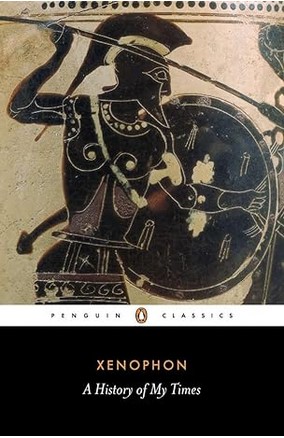
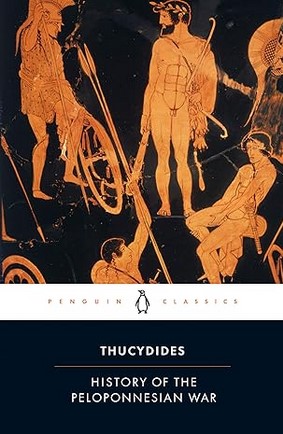
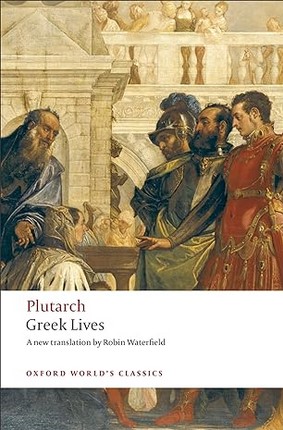
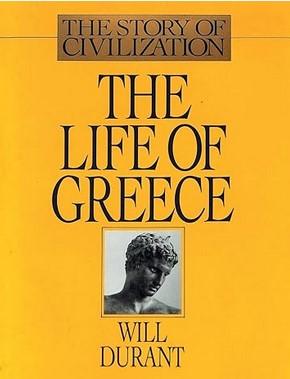

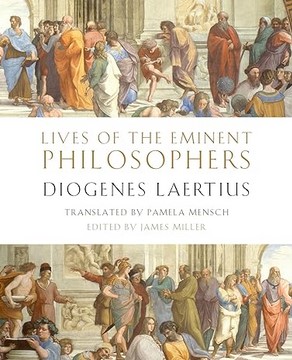
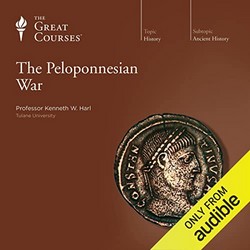

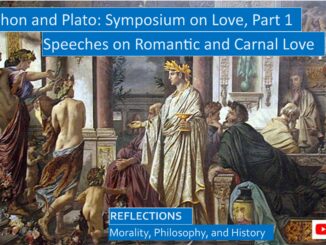
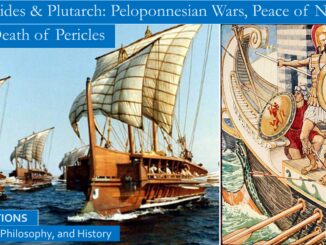
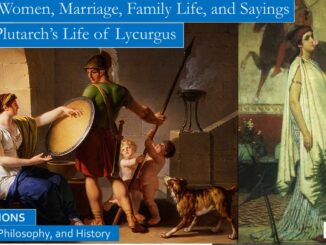
2 Trackbacks / Pingbacks